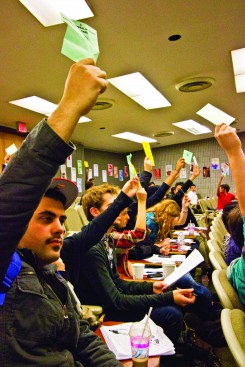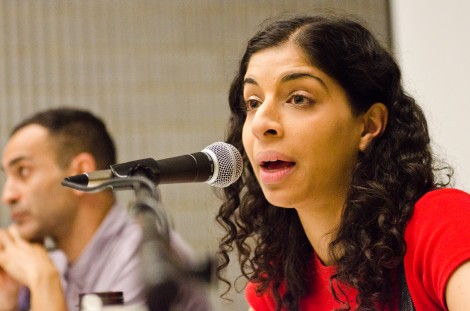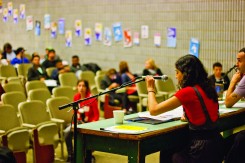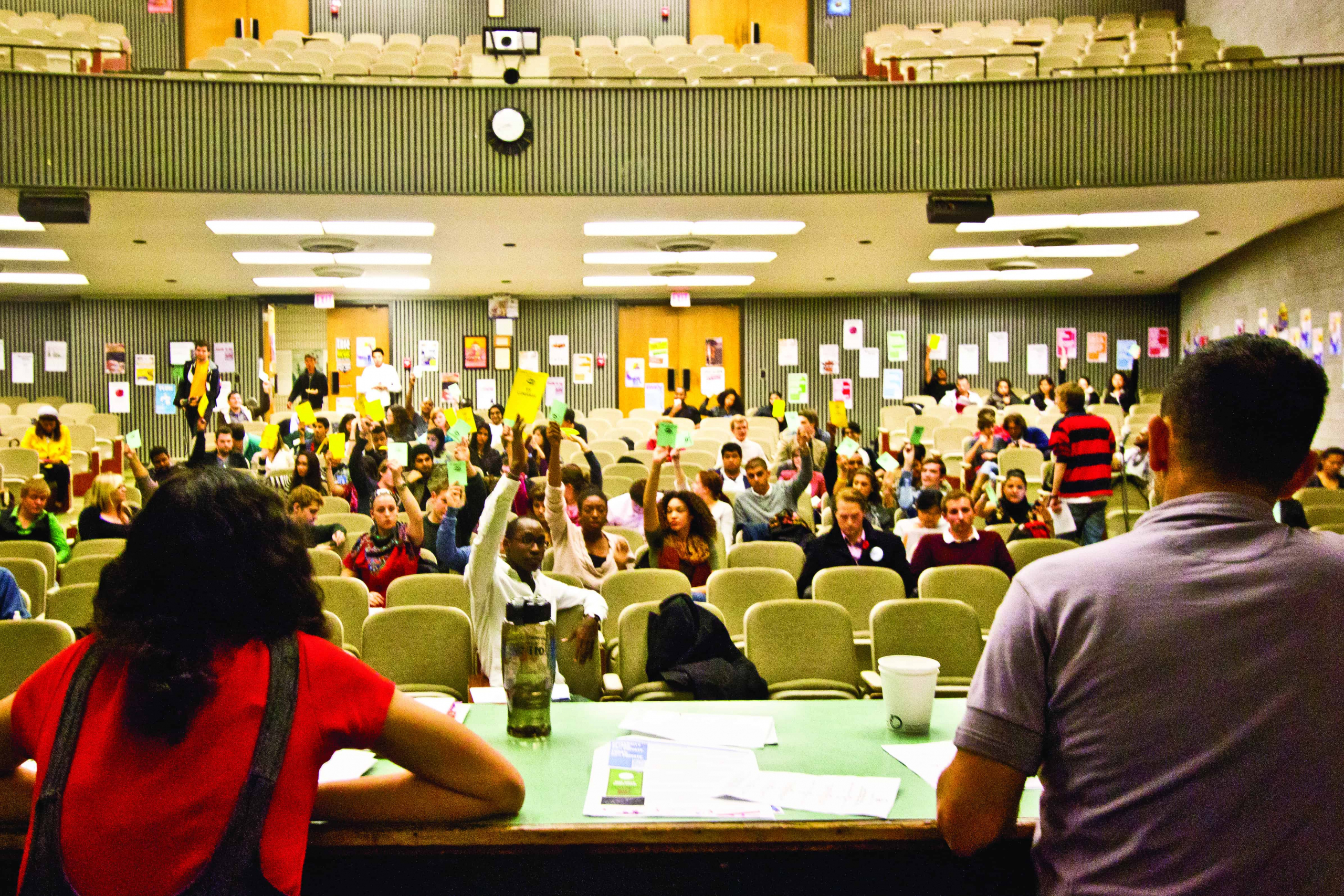The routine agenda of UTSU’s annual general meeting held Tuesday November 15 was overshadowed by heated rhetoric, constant disruption, and a palpable sense of tension. Approximately 100 students gathered in the Medical Science building auditorium to consider several amendments to union by-laws and approve the financial audit of the union. Instead, the meeting descended into a three-and-a-half hour discussion that left many frustrated.
 Proxy voting
Proxy voting
A number of students raised concerns regarding the amount of proxy votes at the AGM; 511 out of 613 votes cast were proxies, making up 83 per cent of voters.
“UTSU bylaws are democratically established by members, and they outline the right for members to carry proxies, so that our members who are unable to attend the meeting can participate and be represented,” said Danielle Sandhu, UTSU President.
Some attendants felt the proxy system worked well.
“It’s impossible to invite every member of the union to a meeting,” said Dimitri Kyriakakis, President of the Greek Students’ Association. “They’re trying to find the most democratic method.”
Proxy voting forms were available three weeks before the meeting, but in a November 18 closed-door meeting of the St. George Round Table, college leaders claimed to not have been informed about the deadline. Confusion also arose regarding the alleged absence of the proxy vote deadline in UTSU’s AGM advertisements.
“This is my third AGM, and every single year, there is a problem with proxies. Every year we are left scrambling at the last minute,” said Alex Heuton, Innis College Student Society’s President, who went uninformed about the deadline until hours before the meeting.
But Sandhu said the information was printed clearly on their advertisements.
“The deadline for returning proxies is indicated on the proxy package itself, and members were reminded of the deadline directly when they came into the union office to pick up their forms,” she said.
Limited debate
A motion to limit the number of speakers sparked objections from some of those in attendance. The measure capped the number of speakers at six — three for a motion and three against. Jake Brockman, an Arts and Science Faculty Council representative, said that the motion “undercut the legitimate democratic process.”
“These proxy votes were not only used to vote on the substantive motions, they were used to limit the debate,” he added. “The simple presence of all those proxy votes fundamentally changes how outsiders to the process view it as legitimate or in this case, illegitimate.”
Other participants, however, saw the measure as time-saving.
“There were too many people that had too many opinions to handle them all in one meeting,” said Kyriakakis. “Really, we are trying to address the agenda that the UTSU brought to us.”
 Few questions answered
Few questions answered
At times during the meeting, UTSU President Danielle Sandhu and chair of the meeting Ashkon Hashemi appeared to grow irritated, repeatedly calling for order and ruling many speakers out of order in mid-speech. “It was disappointing to see at a time where students need to be united that a few members disingenuously disrupted the meeting,” said Sandhu in a statement issued to The Varsity after the meeting. “It was clear that these members were unfortunately aiming to create controversy at the meeting.”
Hashemi didn’t permit any questions on specifics of the union’s finances. Member inquiries concerning a $200,000 increase in staffing costs and an $80,000 expenditure on office inventory were not allowed. Also unaddressed was the union’s operating deficit from last year.
Asked for the specific cost of union-led advocacy during the provincial election, Sandhu declined to provide any specific figures and referred the student to another committee. Pressed for an answer outside the meeting, Sandhu responded that “if members have questions about the finances of the Union, they can come to the Union office at any time and learn more.”
 By-law amendments
By-law amendments
A handful of union by-law amendments also proved to be a source of contention. In an apparent mix-up, union executives and the public appeared to be working from two different versions of the by-laws. The version online were referred to repeatedly by members in attendance but seemed to differ from the hard-copy version used by the executive.
While union executives claimed that all amendments were intended to clarify the by-laws’ language or to eliminate redundancies, others took issue with the proposed changes.
One controversial motion removed the requirement that future AGMs be advertised in specific campus newspapers. The new wording of the by-law calls for advertisements in any “campus publications.” Some speakers felt it was counterproductive to make the by-laws less specific, potentially opening the door to future abuses.
In a later statement, Sandhu explained that the intention of the change was to allow the union to make advertisements in publications beyond those already used.
Another motion appeared to remove the current cap on the number of proxies that UTSU Directors could carry. While Sandhu alleged that the cap is retained in another section of the by-laws, audience members working off the online copy could find no such requirement.
Asked about the discrepancy between the two documents, UTSU Trinity College Director Michael Scott was at a loss.
“I’m not entirely sure. I was looking at the unofficial copy from the website. They had a copy that had a slight difference,” Scott said. “I guess theirs is the official copy, and I really hope it is.”
The most recent publicly available online version of the by-laws does not contain information about the capped number of proxies.
Both amendments passed by a significant majority that was made up mostly of proxy votes.
“I think a lot of student leaders are just looking for a productive forum in which to discuss the issues,” said Brockman. “But they ought to feel that their voice was heard, that they had a chance to debate substantive matters. And that simple benchmark wasn’t met.”
 Union activities
Union activities
These controversies overshadowed the other announcements made by Sandhu. Her presidential address unveiled a host of new services for clubs and students, slated to begin next term. These include discounted membership of up to 20 per cent for the city’s popular Bixi bike rental program, cheaper photocopying services, and expanded support for club promotion efforts.
Sandhu also spoke on the future of lobbying efforts of the union, which will be focused on ensuring the implementation of the provincial Liberals’ promised 30 per cent tuition cut.
“With the election of a minority government, we collectively have an excellent opportunity as students to shape how the grant program will be administered,” she said. “As students, we need to be united and work together to lobby the government to ensure that all of our members have access to the grant.”


